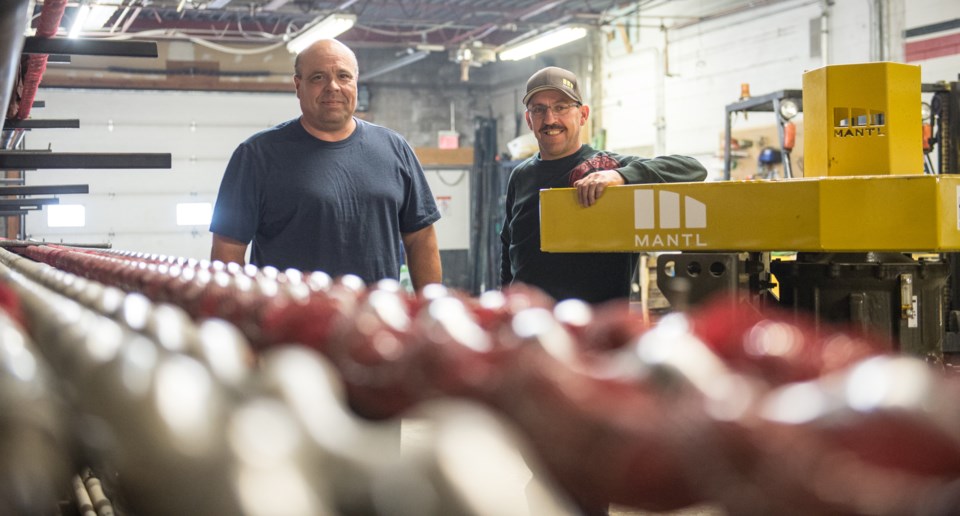Moosomin – Moosomin may be on the fringe of the southeast Saskatchewan oilpatch, but its location was actually quite central to the sales of MANTL Canada, an independent progressing cavity pump (PCP) manufacturer.
Troy Smith is the Moosomin service centre manager for MANTL, where he works with service tech Ted Brehaut. Tony Sernick comes up from Estevan, handling business development for the region.
Smith noted the company was formed in 2014, and he came on in 2015 as one of the partners. “It’s an employee-owned company,” he said.
They have five field locations and one manufacturing centre, in Lloydminster. Besides Moosomin, they have a location in Macklin as well Alberta locations Lloydminster, in Peace River, Sedgewick and Taber. Headquarters is in Calgary.
His background stretched back to working with Grenco, a PCP company. It was bought out by General Electric. “I decided to go in a different direction,” Smith said. “I’ve been in PC for 20-plus years, since 1997. This opportunity came along.”
While not very common in southeast Saskatchewan, progressing cavity pumps are the principal method of artificial lift in the Lloydminster area, especially when it comes to cold heavy oil production with sand (CHOPS).
Often referred to as “screw pumps,” they use a helical metal rotor that spins within an elastomer stator. That stator is inside a metal barrel.
“We have the whole package. Everything you need to make a PC pump system,” Sernick said.
That includes the anchor and stator on tubing.
The sucker rods used for PCPs are somewhat different from those used in reciprocating rod pumps. MANTL carries the appropriate sucker rods, which have different pins and centralizers.
These are to contend with the higher revolutions per minute that PC pumps entail, as high as 400 RPMs.
“You need it centralized,” Sernick said.
That also means that continuous rods don’t really work in these high-water applications. “Too much banging and clanging for high water cut,” he added. That can lead to tubing failure.
Sernick said, “Ninety per cent of our pumps are in the Tilston formation.” That formation is produced in an area around Moosomin, Redvers, Kipling, and Kisbey. They’re also starting to get into Manitoba, as well. That was one of the reasons for setting up in Moosomin, in addition to the fact that’s where Smith is based.
“Our seed has been planted,” Sernick said of Manitoba sales.
“The higher volume, higher water wells are our market,” he added. These are shallower, high-volume wells.
He explained that Tilston formation can see volumes of 100 cubic metres per day and up. “Our market is 100 to 300 cubic metres per day,” Sernick said.
Dealing with water cuts as high as 98 and 99 per cent, Sernick said, “We kind of come in on the end of the life cycle of the well, when everything else becomes uneconomical.”
One of their competitive advantages is use of their own geometry, he noted, with bigger rotors that can take more torque. They use more metal in their stators and have a thicker stator housing.
“Our geometry uses less power than a competitive PCP,” according to Sernick.
“It has more diameters, so it can handle more torque,” he said.
For new products, MANTL has a new 73 millimetre insert system and a transfer/disposal pump on surface.
It will be used to dispose of gas through injection instead of flaring. The concept is to replace a triplex surface pump with a progressing cavity pump, on the surface, in a setup that’s similar to how their test bench operates. A triplex pump could become gas-locked, but these pumps can handle a certain amount. The gas is injected just before the suction at the pump.
It would be useful in applications where it’s not possible to tie into sales gas lines.
“It’s brand new,” Sernick said. The first unit is expected in the region in January 2019.
“We’ve had great acceptance for a new startup Canadian company,” Smith said. This includes a recent EY Entrepreneur of the Year award.
“It says a lot about the group we put together, to survive a downturn in the oilfield. We saw steady growth through those rough years,” he continued.
By having their manufacturing in Lloydminster, it saves on the cost of shipping product. It also means they can get the product to the customer in considerably less time, СŔ¶ĘÓƵ that some competitor products come from overseas.
As for overseas, that works in two directions. While other companies have been selling overseas products into Canada, MANTL is growing in the overseas market as well, according to Smith. They have equipment operating in 12 countries globally.
“That’s really helped us get through the tough times in Canada.”




